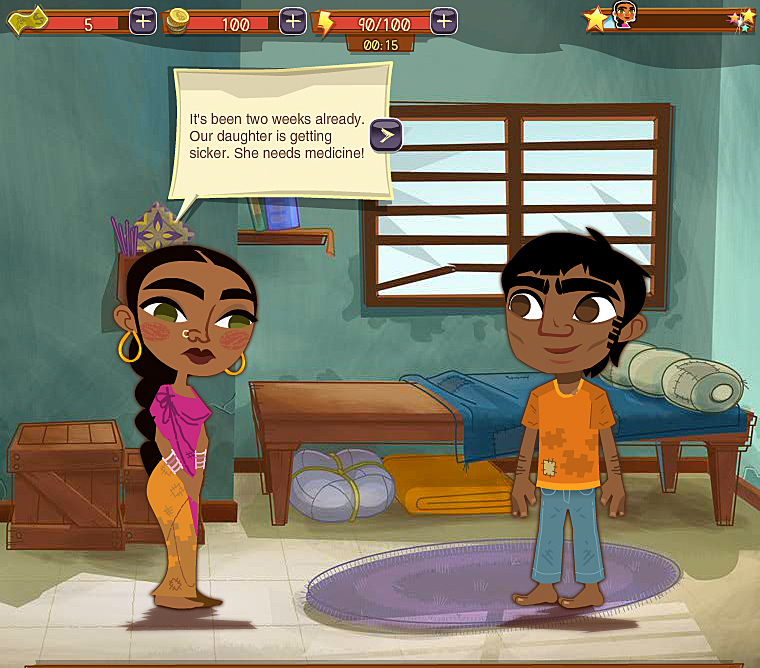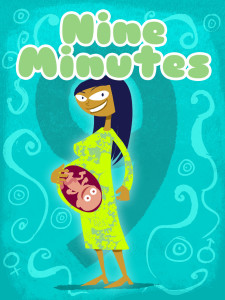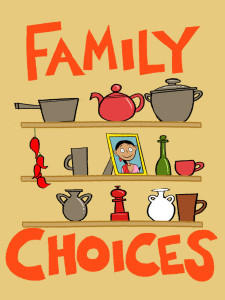Posted December 27th, 2013 at 2:30 pm (UTC-5)
Gamers have heard it all before: games are a waste of time! They are bad for your health. They promote violence, etc., etc. But the fact is some are also catalysts for positive change. And that’s exactly what Games for Change is about.
Games for Change is a non-profit hub that promotes video games as tools for social good, learning and behavior modification. It works with partners and donors to produce projects like Facebook’s Half the Sky Movement: The Game, a spin-off of the movement by the same name inspired by Nicholas Kristof and Sheryl WuDunn‘s best-selling book Half the Sky. Around it were created several games and a TV series.

Radhika talks to her husband in this Facebook screenshot of Half the Sky Movement: The Game. (Courtesy: Games for Change)
“It tells the story of an Indian woman. Her name is Radhika and … she fights with her husband about the right to take care of her girl that is sick,” said Games for Change President Asi Burak. “And he’s telling her, ‘look we have no money to do that.’ And then she basically … starts her own business and … starts to really, you know, fight for herself. And over time she becomes so powerful that she helps others.”
It is a story of empowerment Burak tells TECHtonics. The game raises awareness and motivates people to take action or make donations to help others. So when Radhika collects books for her kids’ school, for example, the player can give books in the real world or, when he/she has enough game points, “we tell you that now because of what you did, Johnson & Johnson is going to give a surgery to a woman in need,” he said.
The game initially targeted the United States. But Games for Change soon started seeing “a lot of people playing from Egypt; and one of our biggest cities is Cairo, and from Turkey, you know Istanbul,” Burak said. “So it kind of matches the people that … are very active on social networks.”
That includes women around 25 years old, who make up a quarter to a third of the players.

Nine Minutes sums up the 9-month pregnancy cycle in nine minutes for pregnant women and their spouses. (Courtesy: Games for Change)
Taking that momentum further, Games for Change journeyed to India and East Asia to get a first-hand look at the problems people face and came back with ideas for three games for low-end phones. These ideas were not only developed because of the needs of people on the ground, but were “tested with them, and they helped us to write the script,” said Burak. “It was a very, very tight collaboration because at the end of the day they are the experts.”
The first fruit of their labor was Nine Minutes – a game that puts pregnant women, or women that want to be pregnant, and their spouses through the 9-month cycle of pregnancy in nine minutes. It is “almost like dos and don’ts of what you should pay attention to,” said Burak.
For the second game – Worm Attack, which helps kids aged 7-12 understand intestinal worms and how to use medicine to treat them – Games for Change partnered with Deworm the World, the organization “giving the pill to millions of kids in both India and Kenya,” Burak said.

Family Choices follows a girl as she grows up and faces choices on early marriage, education and the like. (Courtesy: Games for Change)
The third – Family Choices – a game about the choices a girl faces as she grows up, from early marriage to education – shows players “that those decisions are far from being easy and straightforward,” Burak explained.
Games for Change is partnering with film producers Show of Force to lead a new USAID-funded phase of the Half the Sky Facebook project. The project aims to translate and adapt to Hindi and Swahili both the game and the TV series. The group will also work with marketing companies and local NGOs to distribute the older components in India and Kenya. That will give Games for Change the opportunity for a “real evaluation of the impact and … what happens when a large population is seeing all the components together,” said Burak. “Is it really making a difference?”
Games for Change will have the opportunity to assess its impact. The new project gives it continuity that has been missing from previous endeavors – one-time projects that go out “in the world and you are never able to continue,” as Burak puts it.




